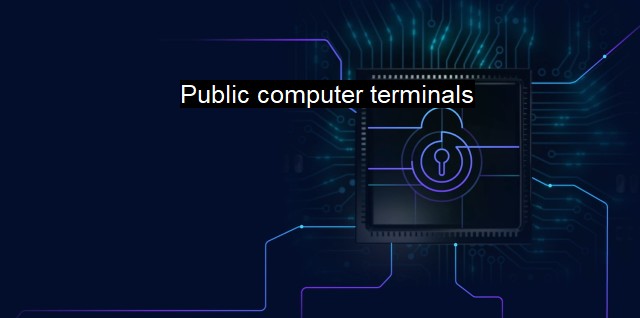What are Public computer terminals?
Understanding Public Computer Terminals: Balancing Accessibility and Cybersecurity Through Antivirus Software Implementation
Public computer terminals refer to computer systems that are installed for use by the general public at different locations such as libraries, shopping malls, airports, hotel business centers, cyber cafes, and more. They are typically used for checking emails, internet browsing, social networking, printing documents, accessing public information, among other tasks. For this reason, they are also known as internet kiosks.In terms of cybersecurity, the use of public computer terminals poses a number of challenges. Public computer terminals are at particular risk as they are often the targets of cybercriminals due to the large volume of information that flows through them and the lack of controls in place. Cybersecurity threats to public computer terminals can be due to various factors including malware infections, keylogging, data theft, and privacy invasion.
One of the primary cybersecurity threats to public computer terminals is malware. These are malicious software that are often designed to corrupt, steal, or delete information from a system. They can be downloaded accidentally or intentionally from suspicious websites or email attachments. Since public computer terminals are used by numerous individuals with varying degrees of tech-savvy, there is an increased risk of malware attacks.
Another threat is keyloggers, a type of malware that records every single keystroke that a user makes. This means that details like card numbers, ATM pin codes, internet banking codes, and passwords to private accounts can be easily stolen. This information can then be used for identity theft or to conduct a myriad of financial frauds.
In relation to antivirus, deploying antivirus software on these public computer terminals is essential for detecting and removing various kinds of malware, including viruses, worms, bots, ransomware, and more. An antivirus program serves like a protective shield for computers, scanning and detecting potentially harmful software and malicious activities.
Simply installing an antivirus does not guarantee complete safety. Antivirus software needs to be regularly updated to tackle the continuously evolving techniques of cybercriminals. For a relatively secure use of public computer terminals, establishments can restrict admin rights, restrict download and install privileges, and ensure regular updates of antivirus software.
Unfortunately, users of public computer terminals often do not have the option to personally install or update antivirus software. In such cases, it becomes entirely upon the users to be aware of potential risks and do their best to protect their own data. This can be achieved by avoiding entering sensitive information whenever possible, minimizing downloads, and remembering to log out of all accounts when finished.
Needless to mention, steps need to be taken by both the entities that operate these public terminals, and the users who avail their services to ensure greater security. For instance, operators could consider automatically deleting all browsing history, cookies, and temporary files at the end of each session and strengthening network security through various measures.
Protecting data and ensuring privacy while using a public computer terminal isn't always straightforward. Therefore, the existence of robust cybersecurity infrastructure and practices for public computer terminals is imperative. While antiviral software works to a great extent to keep these terminals secure, there is a profound requirement for a security-conscious attitude among users as well.
In the end, while public computer terminals provide enormous conveniences, these services are accompanied by the responsibility of cyber vigilance, where each individual user must stay cautious, and educated about potential threats, and operators must provide layered security measures. This combined effort can make public computer terminals a much safer place in the digital world against various cybersecurity threats.

Public computer terminals FAQs
What are public computer terminals?
Public computer terminals are computers that are available for use by the general public in public places such as libraries, airports, and cafes.How do I know if a public computer terminal is safe to use?
It is always best to assume that any public computer terminal may be compromised. However, you can minimize your risk by ensuring that the terminal has up-to-date antivirus software, avoiding entering sensitive information, logging out of all accounts before leaving, and avoiding downloading any files.What should I do if I suspect that a public computer terminal has been compromised?
If you suspect that a public computer terminal has been compromised, immediately stop using it and report it to the appropriate authorities such as the IT department or the librarian if you're in a library.How can I protect my personal information when using a public computer terminal?
To protect your personal information when using a public computer terminal, avoid entering sensitive information such as credit card numbers, passwords, and personal identification numbers. Instead, use your personal device with a secure internet connection, or consider using a Virtual Private Network (VPN) to encrypt your online activities.| | A | | | B | | | C | | | D | | | E | | | F | | | G | | | H | | | I | | | J | | | K | | | L | | | M | |
| | N | | | O | | | P | | | Q | | | R | | | S | | | T | | | U | | | V | | | W | | | X | | | Y | | | Z | |
| | 1 | | | 2 | | | 3 | | | 4 | | | 7 | | | 8 | | |||||||